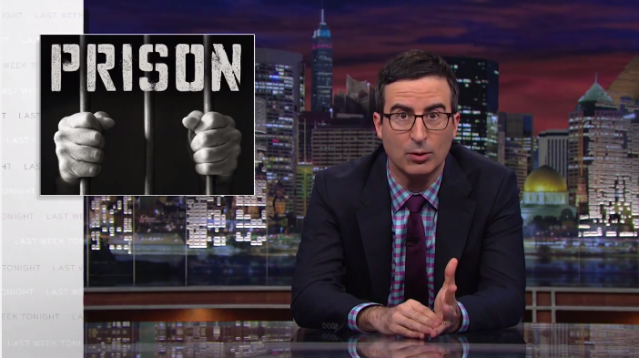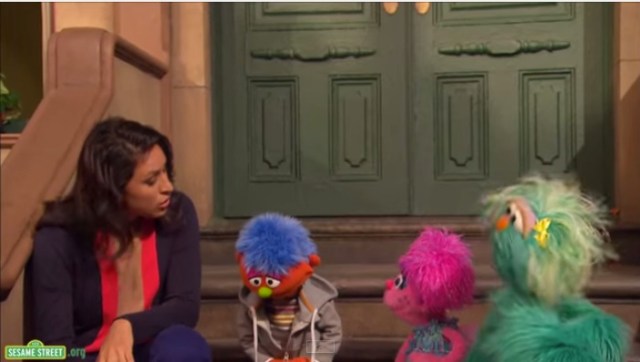This past weekend, on Last Week Tonight, John Oliver railed against America’s prison system. It was glorious.
“Our main story tonight concerns something Americans simply can’t to get enough of: prison… We love prison so much, a shocking number of Americans are currently inside one.”

In a seventeen-minute segment, Daily Show-style with clips and puns and montages, but with the force of a full week of research and rehearsal behind it, Oliver pointed out the following pieces of the broken system:
- the fact that America has the world’s largest prison population, proportionately and numerically
- pop media’s obsession with prison
- prison’s role in dismantling mental health systems and other rehabilitative services
- mandatory minimum sentencing laws
- the racism of drug laws
- jokes about sexual violence in prison in media ranging from Office Space to Sponge Bob
- the unbelievable mishaps that have come as a result of private contractors taking over prisons’ dining and healthcare services — one woman reported a prison doctor cleaning her C-section incisions with sugar (a home remedy pre-dating antibiotics) instead of antiseptics. SUGAR!
- solitary confinement
- high rates of recidivism (and private prison companies advertising this to investors because recidivism makes money)
- the intertwined financial relationships between politicians and private prison companies
But what I really loved about this is that Oliver explicitly talked about the fact that the broken system is not just about bureaucracy and terrible politicians and companies — it’s also related to the fact that our society programs and reprograms itself to not care about incarcerated people and the fact that they are real humans with real lives and families that are terribly affected by the system. “We are doing a terrible job taking care of people that it is very easy for all of us not to care about,” he said.
Oliver featured a Sesame Street skit about incarceration, to highlight how widespread the impact of incarceration is on American kids and families, and to contrast it against most American shows that make prison into a joke, or into something sexy.

Though what he didn’t mention — and, really, this hammers his point home even more — is that this sketch did not actually air on regular episodes of Sesame Street. There was too much backlash from people who could not deal with the idea that people affected by incarceration — the incarcerated and their families — might be deserving of some Sesame Street-style empathy. Instead it was shown in prisons, which just seems completely counterintuitive. Not that people in prison shouldn’t get to see it, but the target audience was people who don’t know the daily struggle of life for kids with incarcerated parents.
Oliver then produced his own spin on the Sesame Street sketch, singing a song with puppets. I honestly didn’t think this was great, and I thought the way he dismissed most of the puppets’ concerns kind of missed the mark, especially after he was so on-point with his analysis. (Yes, I am being critical of his puppet usage not being political enough. Deal.) But I am so down for the last line of the segment, especially using the classic public broadcasting line to coyly implicate his viewers in maintaining the system:
“America’s Broken Prison System is brought to you by decades of neglect, a lack of political courage, and a generous donation of the geo group, as well as viewers like you.”
See the whole thing here:



RIGHT ON. So right on. I was just cheering/weeping through the whole thing. I love that he kept saying, over and over, in case people missed it: “Prisoners are people.” Because it should be obvious, but it’s not…
This makes my abolitionist heart very happy!
The comments highlighted in that feministwire article… ouch. Why don’t people realize that a single poor choice doesn’t mean that a person is inherently “bad”? And if nothing else–you would think people would at least acknowledge that the stigma affects kids of prisoners just as much when we reinforce this “bad people go to prison” message, which a PSA like the one in the Sesame Street episode could start to change. My dad was in and out of prison through my childhood, and questions about where he was or why puts a lot of undue stress and shame on an 8-year-old.
Sugar in a sea section?!?!?! What. The. Eff.
But I gotta say, John Oliver’s shirt and tie game is on point. *takes notes*
God, I couldn’t even laugh at this. The prison system is such a mess.
yay John Oliver
That segment is really important. I feel like I think about this problem more than most people (ie. at all) but John Oliver still had a lot of things to say which I’d never even heard of. Needs to be passed around more.
….>:( I’d always been told that poverty and bad education led more minority groups to drugs. No one ever told me the usage rate is about the same but the conviction rate is different. That’s f’ed up right there. So many systems need to change. It’s probably too big to change the Justice system, and Prison system, and Education system all at once. But we’ve got to do what we can now and keep fixing things until it all works. Damn.
I don’t know this for sure but is it possible that the usage rate of drugs overall is the same but the types of drugs used are different?
Not that it makes much difference, just a thought.
This is true, but recent data suggests that white people are actually more likely to use the majority of drugs than black and latino people. A greater percentage of African Americans use crack cocaine, but the disparity is nowhere near significant enough to account for the disproprtionate rate at which they are arrested and convicted.
http://www.huffingtonpost.com/2013/09/17/racial-disparity-drug-use_n_3941346.html
http://healthland.time.com/2011/11/07/study-whites-more-likely-to-abuse-drugs-than-blacks/